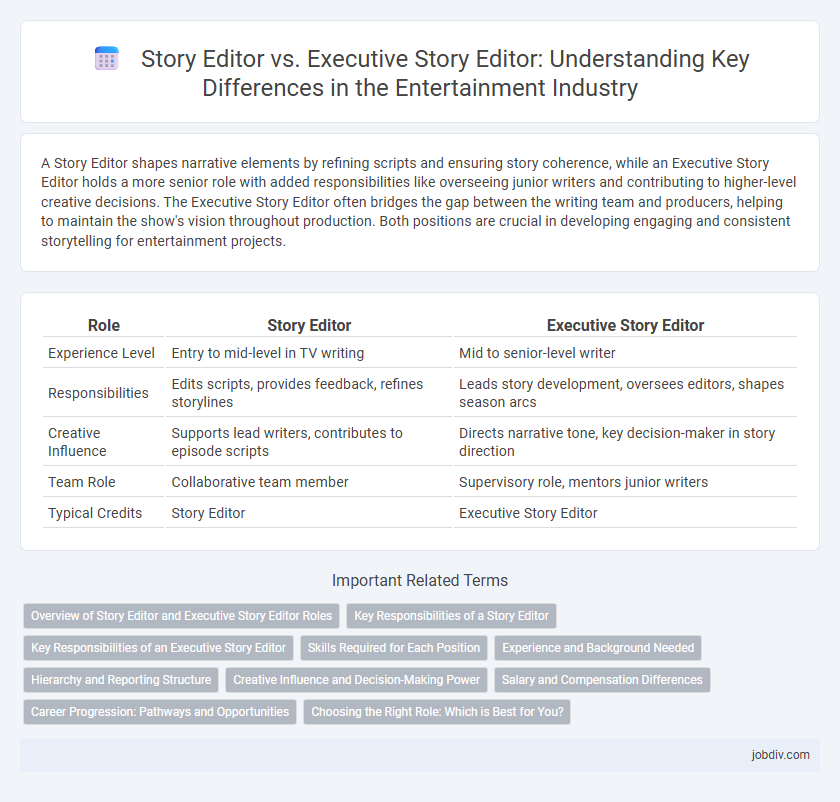A Story Editor shapes narrative elements by refining scripts and ensuring story coherence, while an Executive Story Editor holds a more senior role with added responsibilities like overseeing junior writers and contributing to higher-level creative decisions. The Executive Story Editor often bridges the gap between the writing team and producers, helping to maintain the show's vision throughout production. Both positions are crucial in developing engaging and consistent storytelling for entertainment projects.
Table of Comparison
| Role | Story Editor | Executive Story Editor |
|---|---|---|
| Experience Level | Entry to mid-level in TV writing | Mid to senior-level writer |
| Responsibilities | Edits scripts, provides feedback, refines storylines | Leads story development, oversees editors, shapes season arcs |
| Creative Influence | Supports lead writers, contributes to episode scripts | Directs narrative tone, key decision-maker in story direction |
| Team Role | Collaborative team member | Supervisory role, mentors junior writers |
| Typical Credits | Story Editor | Executive Story Editor |
Overview of Story Editor and Executive Story Editor Roles
Story Editors develop and refine scripts by collaborating with writers to enhance dialogue, plot structure, and character development while ensuring consistency across episodes. Executive Story Editors hold a more senior position, overseeing the story editing process, mentoring junior editors, and contributing to high-level narrative decisions and script approvals. Both roles play crucial parts in shaping the storytelling quality and continuity within television or film production.
Key Responsibilities of a Story Editor
A Story Editor in the entertainment industry is responsible for reviewing and revising scripts to ensure narrative consistency and character development while collaborating closely with writers and producers to refine storylines. They analyze plot structures, provide detailed feedback, and help maintain the show's tone and pacing throughout the writing process. Unlike Executive Story Editors, their role is more focused on day-to-day script editing rather than overseeing the broader creative direction or managing multiple writing teams.
Key Responsibilities of an Executive Story Editor
An Executive Story Editor in entertainment oversees script development, ensuring narrative consistency and character development align with the show's vision. They collaborate closely with writers to refine story arcs, dialogue, and pacing, while maintaining adherence to production schedules. This role requires strong editorial judgment and the ability to balance creative input with network or studio standards.
Skills Required for Each Position
Story Editors excel in narrative development, script analysis, and character arc refinement, requiring strong storytelling instincts and attention to detail. Executive Story Editors demand advanced leadership abilities, overseeing multiple scripts and coordinating writers, necessitating superior communication and organizational skills. Both roles emphasize creativity, but the Executive Story Editor integrates strategic oversight with team management to ensure cohesive story progression.
Experience and Background Needed
Story Editors typically have 2-4 years of experience in television writing or script development, often starting as staff writers or assistants, and possess strong skills in story structure and character development. Executive Story Editors generally require 4-6 years of experience with a proven track record in writing and story management, often having contributed to multiple produced episodes or shows. The Executive Story Editor role demands a deeper understanding of narrative arcs and collaboration with producers, reflecting a higher level of responsibility and creative input compared to a Story Editor.
Hierarchy and Reporting Structure
A Story Editor typically serves as an entry-level position within the writing staff, responsible for developing scripts and contributing to storylines under the guidance of higher-level editors. The Executive Story Editor holds a more senior role, often overseeing the work of Story Editors and reporting directly to Producers or Showrunners. This hierarchical structure ensures that story development maintains consistency while elevating complex narrative decisions to the Executive Story Editor.
Creative Influence and Decision-Making Power
Story Editors primarily focus on refining scripts, offering creative feedback, and ensuring narrative consistency within episodes, directly influencing dialogue and scene development. Executive Story Editors possess greater decision-making authority, shaping overarching story arcs, approving significant plot changes, and coordinating with showrunners to align episodes with the series' vision. Their enhanced creative influence often involves strategic input on character development and major narrative decisions, impacting the show's direction at a macro level.
Salary and Compensation Differences
Story Editors typically earn an average salary ranging from $50,000 to $70,000 per year, reflecting their role in overseeing script revisions and maintaining story consistency. Executive Story Editors command higher compensation, often between $70,000 and $100,000 annually, due to increased responsibilities such as supervising the entire story development process and managing junior writers. Salary differences are influenced by experience, production scale, and union affiliation, with Executive Story Editors benefiting from seniority and strategic input on storytelling direction.
Career Progression: Pathways and Opportunities
A Story Editor typically refines scripts and assists in shaping episode narratives, serving as an entry-level role in television writing teams. Progressing to an Executive Story Editor involves greater responsibility, including overseeing story arcs and mentoring junior writers, marking a pivotal step toward higher-level positions like Producer or Showrunner. This career progression offers opportunities to develop leadership skills and deepen creative influence within the entertainment industry.
Choosing the Right Role: Which is Best for You?
Choosing between Story Editor and Executive Story Editor hinges on your experience and career aspirations in entertainment writing. A Story Editor typically hones narrative skills by reviewing scripts and collaborating with writers, while an Executive Story Editor takes on more leadership, overseeing story development and guiding the writers' room. Assessing your readiness for creative oversight versus hands-on script refinement helps determine the best fit for advancing your role in television or film production.
Story Editor vs Executive Story Editor Infographic

 jobdiv.com
jobdiv.com